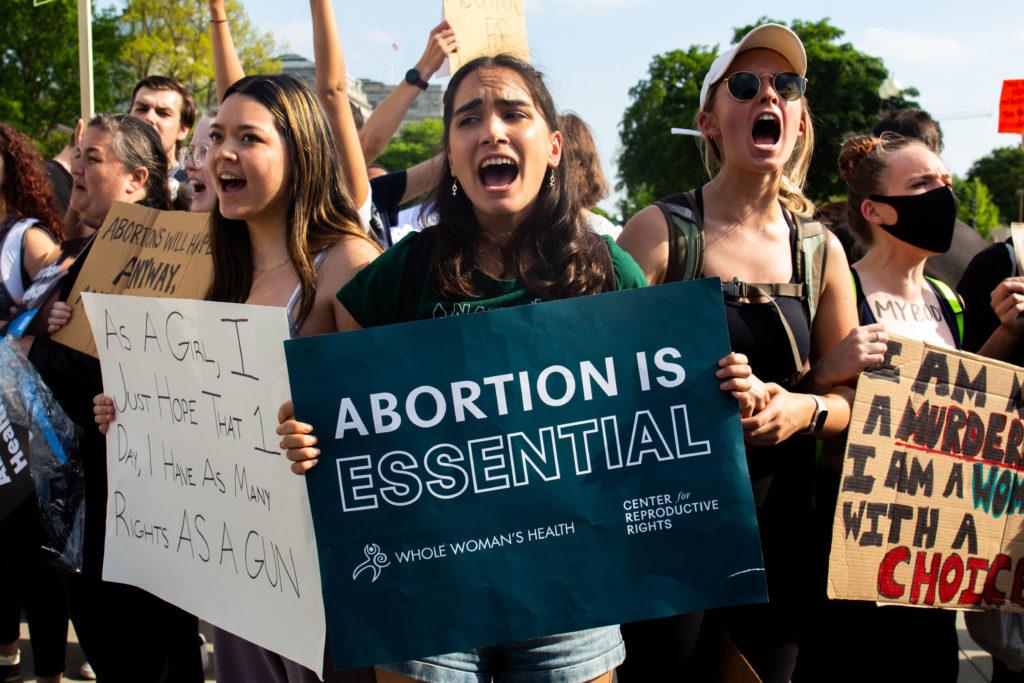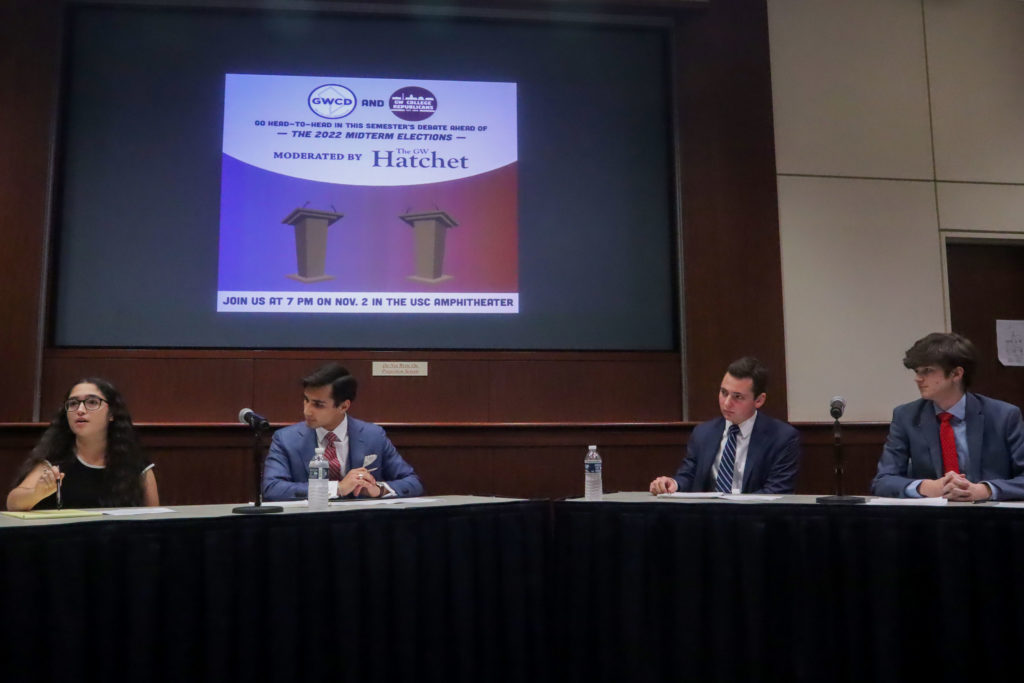Students have cast their ballots in state races across the country for the 2022 midterm elections, focusing their votes on issues like reproductive health care, education and gun control.
More than 30 students said they voted via absentee ballot in November’s elections, where 435 House of Representative and 35 Senate seats, 36 governor races and thousands of local seats are at stake. More than 20 students, some from battleground states like Texas, Pennsylvania and Florida, said they voted in this year’s election to keep candidates who threaten their reproductive rights, safety and education out of office.
Two-thirds of students who voted said electing officials who support codifying reproductive rights is particularly salient during this election cycle after the Supreme Court overturned Roe v. Wade, ending federal abortion protections and triggering a rollback of abortion protections in at least 14 states in June.
Laurin Still, a freshman from Pennsylvania, said she voted this November because the outcome of Pennsylvania’s governor race could determine policies on issues like energy, voter rights and, most pressing to Still, reproductive rights.
“I think with how far-right some of our candidates are, I was really worried about where rights would end up, especially in terms of women’s reproductive rights,” Still said.
Still said Democratic gubernatorial candidate Josh Shapiro, who is in favor of expanding abortion access, is running against Republican Doug Mastriano, who wants to implement a bill that would ban abortion after six weeks of pregnancy if elected. She said abortion rights also motivated her vote in Pennsylvania’s U.S. Senate race between Democrat Lt. Gov. John Fetterman and celebrity doctor and Republican candidate Mehmet Oz. Fetterman supports codifying Roe v. Wade in Pennsylvania’s state constitution, while Oz has said states should decide the legality of abortion, except for in cases of rape, incest or when the parent’s life is at risk.
Isabella Soileau, a freshman from Louisiana, said her state is under a near-total abortion ban after a trigger law prohibiting the procedure took effect in July, excluding life-threatening situations to the fetus or parent. She said birth control accessibility has also become an issue at stake in Louisiana after Republican State Rep. Danny McCormick introduced a bill in May limiting the availability of abortion and contraception like implants and IUDs, a proposal that the state’s House of Representatives later slashed from the legislation.
Soileau said she takes birth control to treat her endometriosis, a chronic and painful reproductive disease. She said she questions the future accessibility of her medication depending on who wins local elections in her state, given the advancing “restrictive” legislation proposed earlier this year.
“The way my prescription is coming through is through my state,” Soileau said. “So as abortion becomes more attacked and as Plan B and birth control become more attacked, it affects my ability to receive health care.”
At least four students said they voted for candidates who support critical race theory to protect education in their states after governors in 17 states like Florida, New Hampshire and Idaho have passed laws to eliminate education that examines how racism is embedded in U.S. laws and institutions.
Khadijah Winder, a freshman from Florida, said she voted in hopes of unseating incumbent Republican Gov. Ron DeSantis, who banned critical race theory from state schools and corporations in April. According to FiveThirtyEight’s election model, DeSantis wins the Florida gubernatorial election against his Democratic opponent Charlie Crist 98 times out of 100 as of Nov. 6.
Winder said critical race theory should be taught in every public school because learning through a critical, historical lens can educate children about how they should act toward others in the present and future, avoiding previous pitfalls that illustrate a history marred by systemic racism.
“Learning our past, even the good and the bad, helps you learn from your mistakes,” Winder said of protecting critical race theory in education. “So not showing students what our mistakes were, it really hinders what they think is right or wrong, progress and how we move as a country.”
Students voting in states with relaxed policies on gun control, like Pennsylvania and Texas, said they voted for candidates supporting tighter gun restrictions like increasing the minimum age to buy a firearm from 18 to 21 with gun violence rising in their states.
Allison Barusevicius, a sophomore from Pennsylvania, said she supports Fetterman’s work to increase gun restrictions, like universal background checks for all gun purchases. Gun violence has increased by 27 percent in Pennsylvania since 2012, according to a report by the Pennsylvania State Police.
Philadelphia surpassed New York City and Los Angeles in the number of victims of gun violence so far this year, with more than 2,000 shooting victims as of Nov. 5. Pennsylvania state law doesn’t require citizens to obtain permits before purchasing firearms or conceal-carrying rifles and shotguns.
“I think gun violence in Pennsylvania, specifically in Philadelphia and Pittsburgh, are huge issues right now as well, so trying to advocate for legislation in those areas is really important to me,” Barusevicius said.
Giselle Sethi, a freshman from Texas, said many people in her state were “upset” with Gov. Greg Abbott’s, R-TX, lack of a response to the murder of 21 people in the Robb Elementary School shooting in Uvalde in May. Abbott did not fulfill victims’ families’ request to increase Texas’ age requirement to purchase a firearm from 18 to 21, calling the proposal “unconstitutional,” which sparked backlash from those families.
Abbott is running for reelection against Democratic candidate Beto O’Rourke. Sethi said she voted for O’Rourke to push for gun control in her state, but Abbott has a 12-point polling lead as of Nov. 5, according to FiveThirtyEight.
“I want to at least say that I did my part,” Sethi said. “I did my part even if the outcome isn’t what I would like it to be, and this year it’s more crucial than ever.”
Some students said they are considering candidates’ stances on immigration and foreign affairs like U.S. relations with refugees when voting in this year’s midterm elections.
Bazgha Paracha, a senior from Virginia who voted in person, said she is from an international community in the state’s 11th District, and the House of Representatives candidates’ ability to represent and provide economic aid to refugees in her district is influential to her when voting. Rep. Gerry Connolly, D-VA, an incumbent who sits on the House’s Foreign Affairs Committee and supports U.S. aid for refugees, is expected to win in her district, according to FiveThirtyEight election trackers.
“For me, what’s most important in my representative is that they are respectful of the various communities that they represent,” Paracha said.
Fiona Riley contributed reporting.





